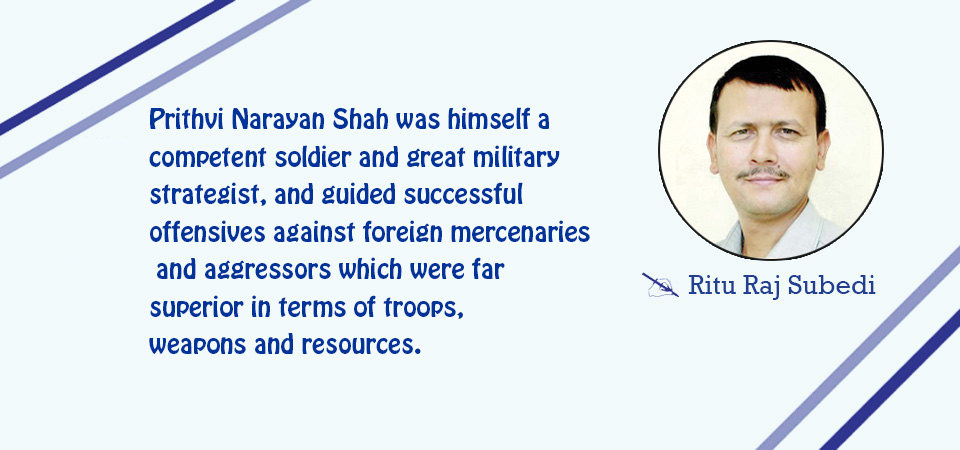A Tribute To Nation's Unifier

Ritu Raj Subedi
Come Poush 27 of the Nepali calendar, an old dispute resurfaces. Some small political parties draw media attention to their demand of declaring Poush 27 as public holiday while some others – mostly those nurturing extremist viewpoints – go against it. Poush 27 is the birthday of Prithvi Narayan Shah, the founding father of modern Nepal. There should not be any controversy in paying tribute to the nation’s unifier who serves as the source of inspiration, pride and unity for Nepalis. Prior to the establishment of federal republican set-up, Poush 27 was marked as the national unity day. But it was scrapped linking it to the monarchical system, a move that smacks of poor understanding of nation’s history and glorious tradition.
Recently Rastriya Prajatantra Party (RPP) and Bibekshil Sajha Party (BSP) have demanded that the government declare a public holiday on Poush 27 (January 11) to mark the birthday of King Prithvi Narayan Shah. The RPP chair Rajendra Lingden handed over a memorandum to Prime Minister Sher Bahadur Deuba to this end. Lingden also recalled that the Deuba government in 2017 had decided to grant a public holiday on this day but it was not implemented. Going one step further, the BSP has proposed to observe Poush 27 as Nepal Day. Both the RPP and BSP, which have identified themselves as pro-kingship forces, have made it a political agenda that can be an emotive issue among the people.
Nepal has undergone many political ups and downs. Nepali people and political parties fought for freedom, democracy and equality for many years. The democratic movements against the despotic Rana regime and party-less Panchayat system aimed to bring the monarchy within the ambit of constitution. But the April Uprising in 2006 bore strong anti-monarchical sentiments. This was the reason the reinstated parliament suspended monarchy and the first elected Constituent Assembly (CA) formally abolished it. The country has been observing the National Day on the 3rd of Ashoj – the day the new constitution was promulgated through the second CA. The new charter has identified Nepal as a federal, secular and republican state.
Despite all these seismic political changes, the country can hardly erase its establishment day from its institutional memory. Neither does it underestimate the contribution of its unifier. The call for observing Prithvi Jayanti has gained further credence in view of government’s decision to provide holiday on Christmas. By granting public holiday to the Christian adherents to celebrate their festival, Hindu-majority Nepali state has demonstrated her commitment to multiculturalism and accommodative behaviour. However, at the same time, this poses a serious question: If the government gives holiday on Christmas, then why can’t it announce public holiday on Poush 27 to honour the builder of nation?
Many former colonised nations mark their independence day with much enthusiasm and fanfare. They revere their national heroes who led their liberation movements. For example, George Washington of the US, Mahatma Gandhi of India, Sun Yat-sen of China, Muhammad Ali Jinnah of Pakistan, and Nelson Mandela of South Africa. But Nepal does not have its independence day because she was never colonised in history. The credit of keeping Nepal’s independence, sovereignty and territorial integrity intact goes solely to Prithvi Narayan Shah, who did not only create greater Nepal from divided principalities but also successfully beat off invading Muslim and British forces in the 18th century.
Prithvi Narayan Shah was himself a competent soldier and great military strategist, and guided successful offensives against foreign mercenaries and aggressors which were far superior in terms of troops, weapons and resources. Had the Gorkhali army not won the battle of Sindhuligadhi in 1767 and Makawanpurgadhi in 1763, his unification campaign would have been left in the lurch and more probably Nepal would have fallen into the clutches of the rapacious British Empire. Prithvi Narayan Shah pioneered and skilfully executed guerrilla warfare to flush out formidable forces of Mir Qasim and captain Kinloch.
Nepal has come a long way since her unification in 1769 but she continues to face bigger challenges on both domestic and foreign policy fronts. Achieving durable stability and inclusive prosperity has still remained elusive. The far-sighted vision of PN Shah, as spelt out in his dibya-upadesh (divine counsels), is quite relevant in the present context. He has stressed on balanced and non-aligned foreign policy to deal with the mighty neighbours. As geopolitics has come full circle in the region, his foreign policy insight is valuable for the government and the ruling political parties in fostering harmonious ties with the neighbours and friendly nations. His economic nationalism, cultural and linguistic pluralism, spiritual values and democratic methods can guide the country on the path of peace, development and happiness.
(The author is Deputy Executive Editor of The Rising Nepal, subedirituraj@yahoo.com)
Recent News

Do not make expressions casting dout on election: EC
14 Apr, 2022
CM Bhatta says may New Year 2079 BS inspire positive thinking
14 Apr, 2022
Three new cases, 44 recoveries in 24 hours
14 Apr, 2022
689 climbers of 84 teams so far acquire permits for climbing various peaks this spring season
14 Apr, 2022
How the rising cost of living crisis is impacting Nepal
14 Apr, 2022
US military confirms an interstellar meteor collided with Earth
14 Apr, 2022
Valneva Covid vaccine approved for use in UK
14 Apr, 2022
Chair Prachanda highlights need of unity among Maoist, Communist forces
14 Apr, 2022
Ranbir Kapoor and Alia Bhatt: Bollywood toasts star couple on wedding
14 Apr, 2022
President Bhandari confers decorations (Photo Feature)
14 Apr, 2022











